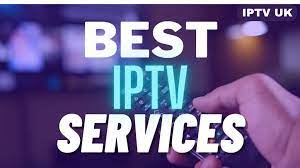
Exploring the Rise and Benefits of IPTV Services
AlexJones
- 0
- 320
In the evolving world of entertainment, the way we consume television iptv uk has undergone a remarkable transformation. Traditional cable and satellite TV have been overtaken by more flexible, cost-effective, and high-quality alternatives. One of the most innovative developments in the TV viewing experience is IPTV (Internet Protocol Television), a service that has quickly gained popularity due to its convenience and variety.
What is IPTV?
IPTV refers to a television service that uses the internet protocol (IP) suite to deliver television programming through a broadband internet connection. Unlike traditional methods such as cable or satellite TV, IPTV doesn’t rely on physical transmission cables or radio frequencies. Instead, content is streamed over the internet, allowing users to watch their favorite shows, movies, and live broadcasts on a range of devices, from smart TVs and smartphones to tablets and computers.
There are three main types of IPTV services:
- Live TV – Provides real-time television broadcasts, similar to what you’d watch on cable or satellite.
- Video on Demand (VOD) – Offers a library of on-demand videos, allowing users to watch movies, TV shows, and documentaries whenever they choose.
- Time-shifted TV – Lets viewers watch a program after it has aired, offering more flexibility than traditional TV.
Advantages of IPTV Services
1. Wide Accessibility
IPTV can be accessed on a wide variety of devices, including smart TVs, computers, tablets, and smartphones. All that is required is a reliable internet connection. This flexibility allows users to enjoy television content wherever they are, at any time, making it an ideal option for people with busy lifestyles or those who prefer watching content on the go.
2. Cost-Effective
One of the primary draws of IPTV services is their affordability. Traditional cable or satellite TV services often come with expensive packages that include a wide array of channels, many of which are rarely used. With IPTV, users can opt for more tailored packages, choosing only the channels or content they actually want. Many IPTV providers also offer subscription-based models that are significantly cheaper than traditional pay-TV services, giving consumers access to a broad range of content at a fraction of the price.
3. Customization and Personalization
IPTV services offer greater customization compared to traditional TV. Since content is streamed over the internet, users can choose specific genres, languages, or types of programming they want to view. Many IPTV services offer personalized recommendations based on viewing habits, making it easier to discover new shows, movies, and documentaries that fit individual tastes.
4. High-Quality Streaming
IPTV offers high-definition and even 4K streaming, which is a huge step forward compared to standard cable and satellite services. Because IPTV relies on internet streaming, there is also a greater ability to provide enhanced picture and sound quality, ensuring a superior viewing experience. With increasing internet speeds, IPTV services can deliver ultra-high-definition content without buffering or interruptions.
5. Multiscreen Viewing
Many IPTV providers allow users to stream content on multiple devices simultaneously. For example, a family could be watching different programs on separate devices, such as a smart TV in the living room, a tablet in the kitchen, and a smartphone in the bedroom. This flexibility ensures that there is no limitation to where and how content is consumed, further enhancing the user experience.
6. On-Demand Content
One of the most attractive features of IPTV is the Video on Demand (VOD) option. This feature gives users the freedom to watch their favorite shows, movies, and even entire seasons of a series at their convenience. There is no need to work around a broadcaster’s schedule, as content is available at any time, giving viewers control over what to watch and when.
7. Interactive Features
IPTV services often come with interactive features that enhance the viewing experience. These can include pause, rewind, and fast-forward options for live broadcasts, on-screen menus, and interactive content such as sports statistics or additional information about a show or movie. IPTV is revolutionizing the traditional television model by providing a more engaging and dynamic way to watch content.
Challenges of IPTV Services
Despite its many advantages, IPTV also faces several challenges that need to be addressed to ensure its long-term viability and growth.
1. Dependence on Internet Speed
The most significant limitation of IPTV is its reliance on a stable and fast internet connection. To enjoy high-quality streams, particularly in HD or 4K, a strong and consistent internet speed is required. In areas where broadband internet speeds are limited or unreliable, IPTV might not be a viable option, leaving users with a poor experience or even service interruptions.
2. Content Availability
While IPTV offers a vast selection of content, some live events, shows, or movies might not be available due to licensing restrictions or geographic limitations. Content availability can vary depending on the IPTV provider and the region, and this could restrict users from accessing specific content that is available on other platforms or traditional TV networks.
3. Legal and Regulatory Issues
The growing popularity of IPTV has raised legal concerns, particularly regarding the use of unauthorized streaming services. While legitimate IPTV providers offer licensed content, many illegal IPTV services have emerged, offering pirated or unlicensed content. This can create issues around copyright infringement and pose risks to users who unknowingly subscribe to illegal IPTV providers. Governments and regulatory bodies are working to combat illegal IPTV services, which may affect the overall availability and quality of the service.
Future Trends in IPTV
The future of IPTV looks promising, with continuous advancements in streaming technology, content delivery, and user experience. Some notable trends include:
- AI-powered Recommendations: IPTV services will increasingly incorporate artificial intelligence to offer more personalized viewing recommendations based on viewers’ preferences, viewing history, and habits.
- 5G Integration: The rollout of 5G networks will dramatically improve IPTV streaming quality, offering faster speeds, lower latency, and improved reliability, allowing users to enjoy ultra-high-definition content without buffering.
- Increased Live Event Streaming: As demand for live sports, concerts, and events grows, IPTV services will expand their live streaming offerings, catering to a larger audience for real-time broadcasts.
- Enhanced Interactivity: Future IPTV services will integrate more interactive elements, such as second-screen experiences, social media integration, and enhanced features for a more immersive viewing experience.
Conclusion
IPTV has revolutionized how we consume television, offering flexibility, affordability, and high-quality streaming that traditional cable and satellite TV cannot match. With its growing popularity, it’s clear that IPTV services are here to stay, offering a wealth of content, customization options, and a user-friendly experience. However, as with any emerging technology, there are challenges to overcome, particularly in terms of internet dependency and legal concerns. As the technology continues to evolve, IPTV is poised to be a cornerstone of the future of television entertainment.
